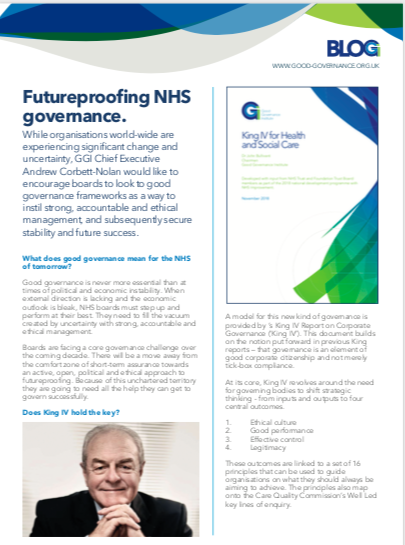Future-proofing NHS governance
30 July 2019

While organisations world-wide are experiencing significant change and uncertainty, GGI Chief Executive Andrew Corbett-Nolan would like to encourage boards to look to good governance frameworks as a way to instil strong, accountable and ethical management, and subsequently secure stability and future success.
What does good governance mean for the NHS of tomorrow?
Good governance is never more essential than at times of political and economic instability. When external direction is lacking and the economic outlook is bleak, NHS boards must step up and perform at their best. They need to fill the vacuum created by uncertainty with strong, accountable and ethical management.
Boards are facing a core governance challenge over the coming decade. There will be a move away from the comfort zone of short-term assurance towards an active, open, political and ethical approach to futureproofing. Because of this unchartered territory they are going to need all the help they can get to govern successfully.
Does King IV hold the key?
A model for this new kind of governance is provided by Professor Mervyn King’s King IV Report on Corporate Governance (‘King IV’). This document builds on the notion put forward in previous King reports – that governance is an element of good corporate citizenship and not merely tick-box compliance.

At its core, King IV revolves around the need for governing bodies to shift strategic thinking - from inputs and outputs to four central outcomes.
- Ethical culture
- Good performance
- Effective control
- Legitimacy
These outcomes are linked to a set of 16 principles that can be used to guide organisations on what they should always be aiming to achieve. The principles also map onto the Care Quality Commission’s Well Led key lines of enquiry.
Learning from other sectors
The Crown Estate, one of the country’s largest property management organisations, is held up as an exemplar of good corporate governance in the UK. While it administers property worth more than £13 billion it does so from the unique perspective of a statutory corporation operating on a commercial basis.

Rather than adopting a single governance code, The Crown Estate has developed its own code. This is based on the renowned UK Corporate Governance Code issued by the Financial Reporting Council and underpinned by the Nolan principles set out by Committee on Standards in Public Life (CSPL). Those principles – selflessness, integrity, objectivity, accountability, openness, honesty and leadership – map closely to those that shape King IV.
This combination of robust accountability within a broader framework of ethical leadership – described by The Crown Estate as ‘conscious commercialism’ – is exactly the blend NHS boards should be looking to embrace as they seek to future-proof their governance.
Level playing field
One thing regulators could be doing to help encourage better governance is to acknowledge that organisations receive different treatment depending on how well they perform. They should therefore make efforts to level the playing field.
Currently, high-performing organisations receive more money, which gives them the luxury of being able to invest and think more strategically. Those at the other end of the spectrum regularly experience high executive churn, and are challenged from both a financial and quality perspective. More often than not this means that they’re more likely to be focused on fire-fighting issues. Unfortunately, there’s often a tendency for hard-pressed organisations to reject governance, that is not formally required, on the grounds that it wastes valuable time and resource, adds bureaucracy and restricts creativity.
But enlightened modern corporate governance, such as the approach set out in King IV, actually reduces bureaucracy. It creates the possibility of a more inclusive, integrated and ethical approach that should be seen as a liberating enabler rather than an onerous obligation
For more information about the King IV Report, please see GGI’s paper on King IV for Health and Social Care.

